|
|
|
Sort Order |
|
|
|
Items / Page
|
|
|
|
|
|
|
| Srl | Item |
| 1 |
ID:
099697
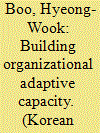

|
|
|
|
|
| Publication |
2010.
|
| Summary/Abstract |
This study delves into the issues of the U.S. Army's adaptive capacity in the Operation Iraqi Freedom (OIF) Phase IV. The author borrows the concept of organizational adaptive capacity while arguing that adaptive capacity framework can provide coherent theoretical explanations for the U.S. Army's unsatisfactory performance in OIF Phase IV. The author, then, tries to apply the analysis of U.S. Army's experience to the Republic of Korea (ROK) Army. The ROK Army has tried to follow the U.S. Army from doctrine to weapon systems and the author sees that there is a possibility that the ROK Army will be faced with similar challenges that the U.S. Army had to deal with. Thus, the author argues that drawing theoretical implications and lessons from U.S. experiences should be regarded important tasks for the ROK Army.
|
|
|
|
|
|
|
|
|
|
|
|
|
|
|
|
| 2 |
ID:
099696
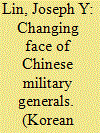

|
|
|
|
|
| Publication |
2010.
|
| Summary/Abstract |
It is difficult to overstate the importance of the human factor in any institution. The motivation of this study is to discern patterns, by examining and analyzing the biographical information of those who had been promoted to People's Liberation Army (PLA) full generals (shangjiang), for a better insight into how Chinese military leadership has remade the PLA. A close examination of biographical information of PLA generals promoted during the past three decades indicates a number of intriguing patterns and trends, suggesting that Jiang Zemin and Hu Jintao during their tenures as chairmen of the Central Military Commission (the highest command authority in China's armed forces) have furthered the modernization of China's military by incorporating elements of diversity, stability and professionalization into the promotion practice of PLA generals.
|
|
|
|
|
|
|
|
|
|
|
|
|
|
|
|
| 3 |
ID:
099693


|
|
|
|
|
| Publication |
2010.
|
| Summary/Abstract |
This essay is a contribution to the discussion on human and non-traditional security (NTS) versus development by looking at the threat of climate change. There is overwhelming evidence that mankind's survival is at stake if collective action does not stop global warming. The UN Security Council (UNSC) discussed this threat in 2007. There are many ways in which climate change is threatening human security. However, the possible impacts are so varied and causal links to conflict are so difficult to establish that it is not logical to define climate change as an NTS on the basis of the nature of the threat only. A focus on the plausible sequence of threats and the means to deal with them at various points in time provides a more appropriate framework to understand that climate change is both a development issue and a human security threat. Climate change is an example of the development-security nexus and underlines the importance of using, in a coherent fashion and at various points in time, different and multilateral policy tools to tackle it. These instruments can range from typical development policy tools like Official Development Assistance (ODA) to the use of traditional security instruments, such as military force. Arguably, other threats could also be looked at from such a "threat sequencing" perspective. This approach thus allows for the explanation of relations between development, human security and traditional security and can be tested against other kinds of NTS.
|
|
|
|
|
|
|
|
|
|
|
|
|
|
|
|
| 4 |
ID:
099695
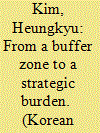

|
|
|
|
|
| Publication |
2010.
|
| Summary/Abstract |
The purpose of this article is to understand China's changing strategic views on North Korea during Hu Jintao's era and to consider the implications for South Korea's policies toward North Korea and China. Sino-North Korea cooperation can be theoretically explained by the alliance transition theory, a modified one from the political realist perspective. The implications of the alliance transition theory are that China would strengthen its alliance with North Korea, seek to weaken the South Korea-U.S. alliance, and induce South Korea to cooperate with China, while preventing North Korea from getting close to the United States. However, it is noteworthy that even in China, there exist various groups of strategic thinking in international relations on China's roles in North Korean issues. North Korea's incessant provocations have effects on mobilizing the Developing Country Diplomacy School as well as the Rising Great Power Diplomacy School against North Korea. Such incidences would soon reverse the rule of thumb of North Korea's strategic value rising alongside regional tensions, calling into question in China, again, the strategic value of North Korea. China still maintains its previous policy priorities at askance, but since North Korea's second nuclear test, the contents have been changing reflecting the changing security environments and its recalculation of national interests. As the more the North Korean nuclear crisis deepens, threatening peace and stability on the Korean peninsula, the more China would positively think over North Korea's contingency intensifying cooperation with the United States. In such transition, the stronger the rising great power thinkers, the less the diplomatic space for North Korea exists. North Korea would stop being a buffer zone but a strategic burden in their perspective, transforming China's relationship with North Korea from a special relationship to a normal state-to-state relationship.
|
|
|
|
|
|
|
|
|
|
|
|
|
|
|
|
| 5 |
ID:
099694
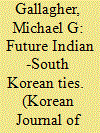

|
|
|
|
|
| Publication |
2010.
|
| Summary/Abstract |
India is an emerging great power and South Korea is a rising middle-ranking state. Both nations are democracies whose economies are increasingly intertwined. Seoul and New Delhi also share a potential problem-China. India often views Beijing as a possible enemy, while South Korean leaders have to be worried about maintaining their nation's independence in a world of expanding Chinese power. Therefore, this article will concentrate on the possibility of South Korea and India establishing a strategic relationship that goes beyond economics to include extended military ties. While analyzing the prospect for a robust strategic alliance between the two states, this paper will examine Indian-Korean economic ties, how Indians and South Koreans view China, the continued value of the Republic of Korea-United States alliance, what role Seoul's arms industry can play in India's military buildup, Indian foreign policy and strategic culture as it relates to Korea, and possible Chinese reactions to enhanced Indian-South Korean security ties. This paper's final thoughts will be that while it would be wise for Seoul to strengthen economic relations with India, it would be dangerous for South Korea to insert itself into the India-China power competition through expanded military ties with India.
|
|
|
|
|
|
|
|
|
|
|
|
|
|
|
|
| 6 |
ID:
099698
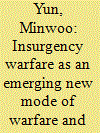

|
|
|
|
|
| Publication |
2010.
|
| Summary/Abstract |
Asymmetric insurgency warfare is the dominant form of conflict today. The global community has been observing this form of conflict around the world for the past 15 years. The current insurgency warfare is substantially different from warfare of commonsense. This new enemy, the so-called insurgents, is a group of small irregulars, terrorists, religious fanatics, and criminals. Strikingly, the highly advanced and mighty military such as the U.S. forces cannot completely win this battle, despite so much efforts and sacrifice. Rather, the inferior Islamic insurgents seem to be gaining in strength. This paper is an attempt to understand today's irony. For doing so, it tries to explain: (i) what the historical meaning of asymmetric insurgency warfare is; (ii) who this new opponent, called Islamic insurgents is; and (iii) how this new enemy fights. This paper argues that the current asymmetric insurgency warfare should be understood beyond modernity. It suggests that the insurgency warfare is a new mode of warfare, the identity of the Islamic insurgents is a network comprising insurgents, terrorists, tribal warriors, and criminals, thus blurring definitional boundaries of war-methodology. The current insurgency warfare, including the conflicts in Afghanistan and Iraq, are examined in this article. The current insurgency warfare, including the 2001 Afghanistan and the 2003 Iraq, is examined in this article.
|
|
|
|
|
|
|
|
|
|
|
|
|
|
|
|
| 7 |
ID:
099691


|
|
|
|
|
| Publication |
2010.
|
| Summary/Abstract |
Conventional wisdom argues that President Obama inherited a U.S. reputation that was badly damaged around the world. While this may hold true in Europe, in Asia, where U.S. standing matters most, there was never such a precipitous decline. To Europeans, the Iraq War stirred moral outrage and rabid opposition. However, the situation in the Persian Gulf simply did not matter as much to Asians. There were pockets within Asia that were critical of U.S. actions, but this was overshadowed by an overwhelming support for values such as democracy and human rights. Evidence shows that even vis-agrave-vis China, U.S. standing has not faced a significant decline in the region. The result is that Asians continue to perceive the United States as the closest thing to an honest broker in the region, as evidenced by positive reactions to the leadership role that the United States took in response to the 2004 tsunami. Representing 60 percent of the world's population, compared to Europe's seven percent, Asian views are probably most important for the future of the United States. Thus, President Obama has a solid base in Asia from which to build leadership and goodwill, but he must do so amidst the challenges of the global financial crisis and heightened expectations.
|
|
|
|
|
|
|
|
|
|
|
|
|
|
|
|
| 8 |
ID:
099692


|
|
|
|
|
| Publication |
2010.
|
| Summary/Abstract |
Poland is an active supporter of the Proliferation Security Initiative (PSI), a multinational cooperation effort to interdict weapons of mass destruction (WMD) related materials, launched by President George W. Bush in Krakoacutew on May 31, 2003. The article describes the Polish engagement in the development of the Initiative, broadening the number of participating countries, conducting exercises and organizing PSI meetings. The issues of the effectiveness of the cooperation and the prospects for the future are also discussed. In the case of Poland, its engagement in the PSI has had a positive impact on the country's international and regional image and position. Poland has been able to establish itself as one of the leaders of the Initiative. Domestically, the PSI participation has helped to strengthen the coordination between the different state institutions and agencies dealing with non proliferation.
|
|
|
|
|
|
|
|
|
|
|
|
|
|
|
|
|
|
|
|
|